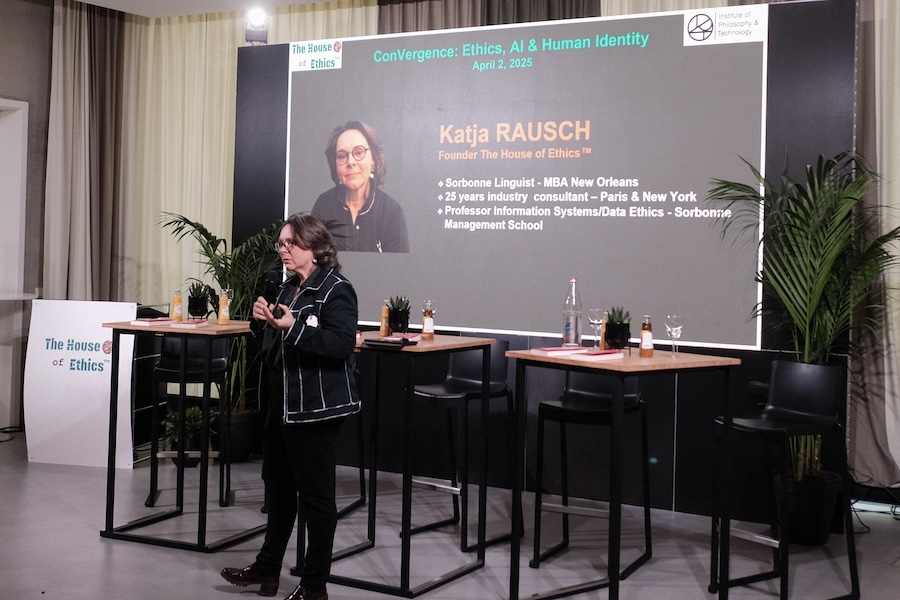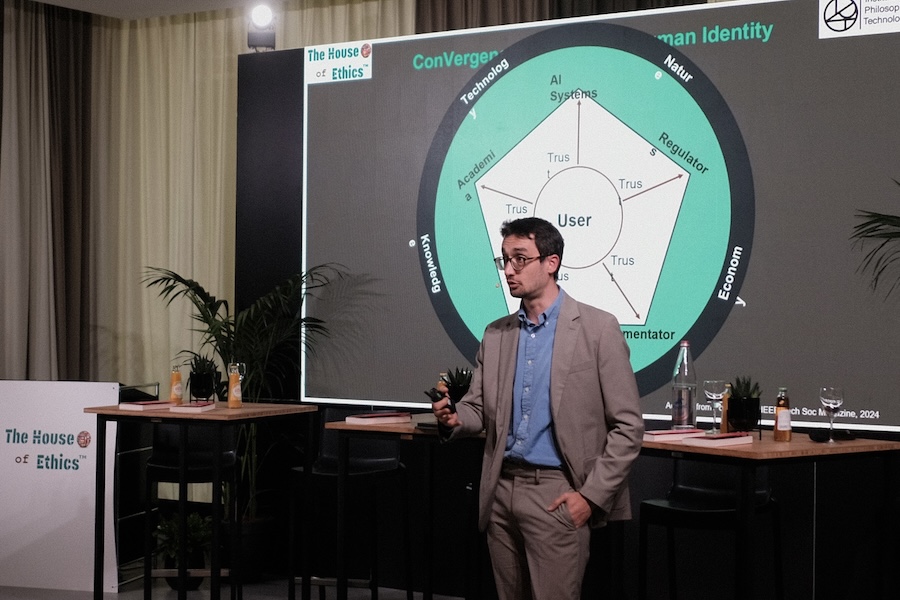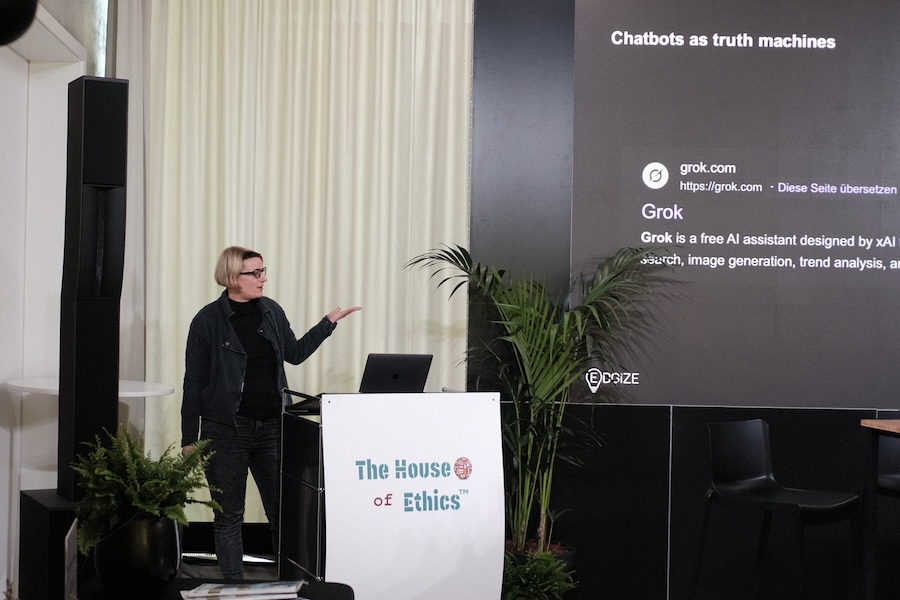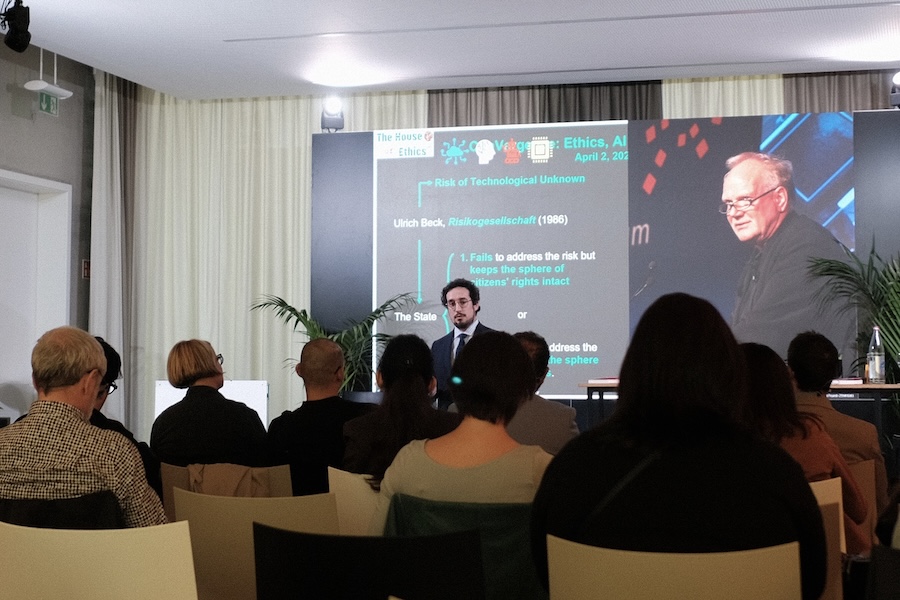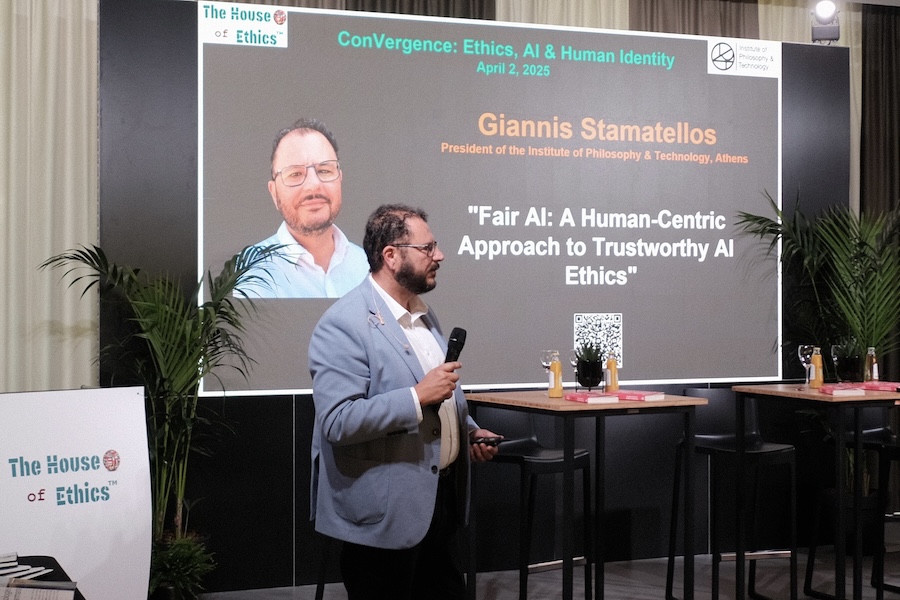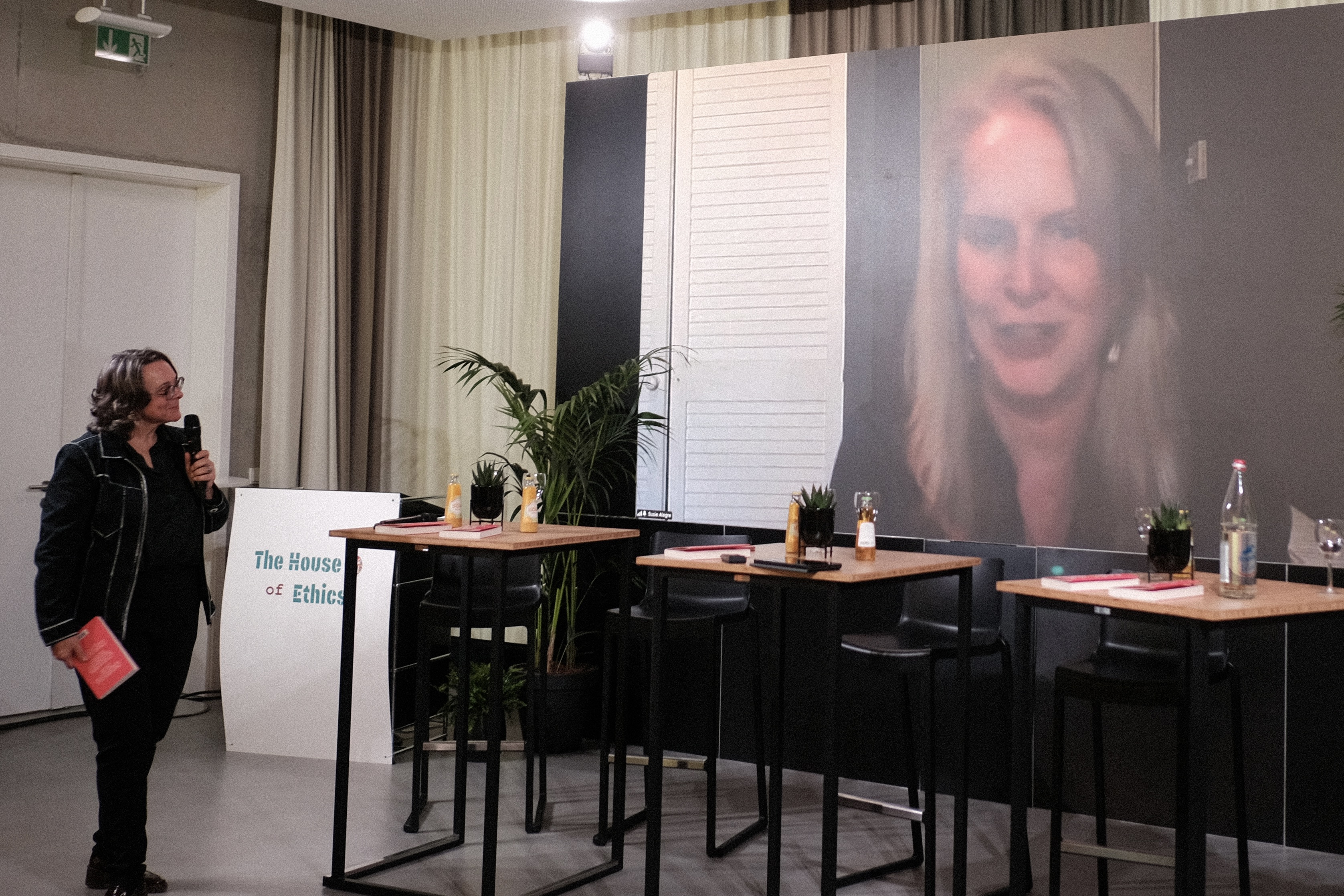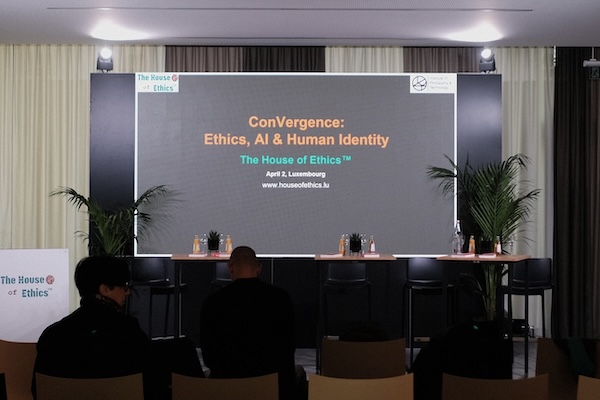 "ConVergence: Ethics & AI" conference at The House of Ethics;
Credit: Steven Miller, Chronicle.lu
"ConVergence: Ethics & AI" conference at The House of Ethics;
Credit: Steven Miller, Chronicle.lu
On Wednesday 2 April 2025, Luxembourg's The House of Ethics hosted the "ConVergence: Ethics & AI" conference at the Forum Da Vinci in Luxembourg-Ville.
The event, hosted by the founder of The House of Ethics, Katja Rausch, asked participants and attendees to question the impacts of artificial intelligence (AI) upon society from an ethical and social perspective and raised issues relating to the biases inherent in the rules and information used to power AI.
The event featured speakers including Director of Interdisciplinary Research at The House of Ethics, Daniele Proverbio, founder and CEO of EDGIZE GmbH, Claudia Becker, Senior Assistant Professor of Administrative and Public Law at the University of Eastern Piedmont, Dr Stefano Rossa, Professor of Philosophy and the Founder and President of the Institute of Philosophy and Technology in Greece, Giannis Stamatellos, Digital Strategist and Deep Tech Diplomacy Advocate, Dr Ingrid Vasiliu-Feltes, and international human rights lawyer and author, Dr Susie Alegre.
A "digital twin" of Katja Rausch appeared onscreen and welcomed guests to begin the proceedings. The avatar explained that, in the absence of the real Ms Rausch, it would present today’s event and proclaimed: "I am 100% fully productive and reliable and robust and reliable and robust and reliable and robust". The avatar then froze onscreen. The real Katja Rausch then introduced herself to the audience and stated: "This is exactly why we always need humans behind artificial intelligence. To back up, to control and to orchestrate."
Ms Rausch then welcomed the event's guests and attendees, provided a history of The House of Ethics and its work in the field of digital ethics and spoke of the different models of AI - General AI, Generative AI and Augmented Identity - which would be discussed by the speakers. She talked of the importance of the language used to build and communicate with AI and described how, "with human-machine interactions, everything changes. We change. Our behaviour changes. Our linguistics, our words change. Our thinking changes." Ms Rausch also touched on the influence of ChatGPT and how its ubiquity has transformed it from a tool into a system and how this change influenced The House of Ethics to design a framework for the integration of ethics into the coding and development of AI systems.
Daniele Proverbio then took to the stage to present his views. Mr Proverbio talked of the interconnections between the various actors involved in AI ecosystems and how the implementation of ethics into these systems can be for the benefit of its users, as they are at the heart of AI. He stated: "At the centre of everything, we have the users, the adopters, us in practice. This is very important. It's something that puts AI apart from many other different technologies for which we have ethical debates." Mr Proverbio then described how the concept of trust is fundamental to the success of AI technology and posited the idea of a system of decentralised ethics which would utilise all actors in the AI chain to question and shape how an AI system should function ethically.
The next speaker, Claudia Becker, spoke of the influence of generative AI, its impact on digital culture and its ability to skew reality through the information it provides to its users. She noted: "What is knowledge? What is thinking? What is consciousness? What is right? What is wrong? What is good? What is evil? What is true? What is reality? As quickly as the acceptance of generative AI applications grew, so did the philosophical, ethical and political concern about it." Ms Becker then touched on how, as humans, we already use biases, prejudices and stereotypes to navigate the world around us, so it should not be a surprise that these traits also appear in AI systems. She detailed how these AI biases stem from the language and data sources we use and how, even if we utilised only the reference material from a university library, we would still not be able to achieve objective results from these AI systems. She noted: "I want to point out that already the data of cultural heritage, like books, have a special perspective, a worldview and bias in them. We all know that women and people of colour are not well represented in our cultural heritage and this will accelerate now with these machines." In closing, Ms Becker stated: "The idea of automating everything and getting rid of human inference will not lead to better results, unfiltered results or objective responses. It won't represent the unfiltered truth or reality because language itself is not transparent."
It was then the turn of Dr Stefano Rossa to present his views on the relationship between AI and cybersecurity and the unknown risks this presents. Dr Rosso talked of how, historically, risk came from events such as natural disasters and that technology was a tool used to mitigate risk and facilitate progress, but, with AI, the technology now represents a risk itself. He went into detail about the European Union’s (EU) approach to implementing AI regulation and the principle of algorithmic transparency in AI systems, to mitigate discrimination and bias, and he explained the notion of the non-exclusivity of automated systems, which would ensure citizens maintain the right to human interaction with civil servants and not be forced to interact with automated systems.
Katia Rausch then invited Giannis Stamatellos to the stage, where he talked of the ethical philosophies which could be utilised in AI development and the trustworthiness of AI systems. Mr Stamatellos noted: "We need to emphasise the human oversight issue. Keep humans in the loop in different phases of how AI is produced. This is extremely important." He went on to question the subject of fairness in AI systems and how this is guided by the data used to train them. In closing, he added: "I would emphasise that there is a need of a narrator, a narratology, a virtue ethics perspective to start reconsidering what is fair and trustworthy - AI ethics in general, where human empowerment is important."
The next speaker, Dr Susie Alegre, joined via video call. She talked of the impact of AI on the creative industries and how this, and the story of a Belgian man who took his own life after building a relationship with an AI chatbot he had created, were the catalyst for her latest book Human Rights, Robot Wrongs: Being Human in the Age of AI. Dr Alegre touched on the dangers of the speed at which AI technology is being adopted and integrated across all areas of society, particularly in relation to the loneliness epidemic being reported across the world and the consequences of how humans are choosing to interact with AI chatbots. She noted: "What we are seeing is a real boom in AI replacing the sort of mirrors that we give back to each other in human relationships." Dr Alegre then detailed the positive sides to AI systems but that there is a need to evaluate how and what these are used for. She emphasised: "It is not all about whether you're for or against AI. That is a meaningless dichotomy. What it's about is identifying specific forms of AI that meet specific needs, in ways that support whether it is human dignity, whether it is justice, whether it is the right to life and our ability to extend our lives." Touching on the subject of the environmental concerns surrounding the energy usage and resources behind the development of AI, she added: "The whole lifecycle of the tech we use will become supercharged with the advent of AI, pushing for more things, newer gadgets, more powerful technology. We need to really think about what that means for our world and the rest of the world." In closing, Dr Alegre detailed her frustration in learning that her first book Freedom to Think was being used by META to train its AI system without her permission. She described how this infringement of her copyright is one of many examples of the impact of AI on the value we place on human creativity and the future development of art.
Dr Ingrid Vasiliu-Feltes, the final speaker, also joined the event via video call and spoke on the subject of identity in the digital age and what this means. She also talked about the relationship between physical and digital domains and the challenges the transition to AI, digital ecosystems and blockchain technologies are placing on society at cultural, corporate and governmental levels. In describing this relationship, she stated: "It has challenged us to revise our ancient ethics constructs as well as our human identity. I think we can all agree that our society and economy are undergoing a metamorphosis, sometimes a good one, sometimes, unfortunately, not such a pleasant one."
After concluding the speeches, the guest speakers held a panel discussion to explore the topics raised.
SM

